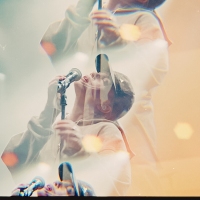 As Festival Fashion Trends Evolve, Let's Put Judgemental Commentary In The BinLet's try be a bit more accepting of peoples' festival wear, however out there it may seem.
As Festival Fashion Trends Evolve, Let's Put Judgemental Commentary In The BinLet's try be a bit more accepting of peoples' festival wear, however out there it may seem.

Forget lock-outs, Perth's nightlife has a bigger problem: Respect
Over the years, Perth nightclubs have caught negative attention time and time again, and it's a sign of a bigger problem.
There's a lot of troubling issues for nightclubs and bars in Perth. While lock-out laws have never had much of an effect on Perth's nightlife (something likely to continue, seeing as New South Wales are currently rolling back their own), battles with declining wages and increased costs of living mean that venues are battling with each other over attention and tickets, only aggravated by an increasing popularity in pop-up bars, summer festivals and a strange, seemingly west-coast-centric fascination in day-drinking parties: festival-sized club nights, running through the day, in open-air venues throughout summer.
It's a battle as well-researched as it is well-known and one many Perth bars are losing at, with many once-notorious nightlife districts rich with restaurants, bars and clubs now nothing but empty carcasses and life-lacking apartment buildings. There are pockets still thriving, perhaps thanks to the dense foot traffic in some central venues and clever bookings and events at others, but many of these venues are now faced with a problem that only seems to worsen as time continues, and one that can't be solved as easily: a lack of respect.
While the large majority of Perth bars, clubs and live music venues are as dedicated to creating a safe, respectful space for people as they are to forward-thinking bookings and selling tickets, the last two years particularly have seen a handful of venues attract negative, country-wide attention for irresponsible management.
In 2019, safety and inclusivity are two things people actively seek in their nightlife - fair enough too, considering the swelling problem of assault and problematic behaviour at nightlife hotspots nationally - and there's a number of bars unable to cater to this. Throughout the two years particularly, several Perth nightclubs and bars have made national news for their incapability to adapt and change. It seems that they have no idea how to grasp the needs of people in 2019 and what people seek from the venues and experiences they're providing, and it's reflecting poorly on not just them, but a nightlife scene generally quite wholesome and community-built.

The incident currently finding national attention is recently re-opened Perth nightclub Rapture - a venue in Perth's club-populated Northbridge district - that is facing backlash for a poor response to an alleged spiking incident. The problem isn't so much the drinking spiking - something that's quite common, and can happen regardless of how inclusive and safe a venue is - but rather the owner's response to the said incident: "What proof do you have of your drink being spiked?" he questions. "Why would anyone want to spike your drink? Are you worth someone trying to spike your drink?"
What initially began as the person notifying the club of spiking incidents affecting both her and two friends in the past, has quickly blown into a case example of this disrespect aforementioned. The owner doesn't attempt to aid the woman - a 19-year-old - in finding CCTV footage or even promises to tighten security or make them aware of the problem, he just jumps on the defensive; his nightclub and attitudes more important than the health of the woman, or even respecting her in the slightest. Being asked whether you're 'good' enough to be spiked is... not the way to go about it, and something someone should never be asked.
Then, to further shame and disrespect the woman, he shares CCTV of her walking out of the nightclub with the caption "The large girl with the white top, the short black skirt and the black and white shoes is the girl who claimed to have had her drink spiked." Regardless of how spiking drugs work (unlike MDMA, they often take far longer to have a visible effect on the person consuming them, so the drugs might not have even hit her at that point), pointing her out and public shaming her - as the "large girl," no less - is the exact opposite of the required response; a gross moment of victim-blaming and shaming that amplifies the problem at play.
Rapture Nightclub isn't the only place to find these problems either. At the start of this year, Perth club Amplifier became the centre of a similar outcry concerning the specific cuts of gendered work uniforms (the men's tee being a crew-neck cut, while the women's tee features a cut with deep cleavage), and while the uniform itself was indeed the starting problem (and something that could easily be rectified and moved on from, mind you), the venue's disrespect towards not just their female employees, but females in general, came with larger implications, and a return of this disrespect often sexist in nature.
To begin, Capitol Corp chairman David Heaton - the company behind Amplifier - told anyone not willing to comply to the new dress code could "find employment elsewhere," before a second post just deepened the lack of respect the venue held for female employees: "We are going to make a complete backflip and make the boys were female shirts too," the post joked. "Women can wear men's shirts as long as they are not overly baggy and men can wear women's shirts as long as there isn't too much cleavage showing." Surely there are alternatives to selling the female body to drive bar traffic, but apparently, some venues don't have the respect to work it out.
At the start of 2017, another example featuring popular Northbridge bar The Brass Monkey became one of the earlier cases of this female-directed disrespect. A series of degrading banners were hung from the venue's top balconies, with a number of absolutely gross slogans written across them: “You teach her MORALS. We’ll teach her ORAL," read one. "Our couches pull out, but we don't", "Drop your freshmen daughters off here" and "Drop panties not bombs." They're not humorous and they're not a ticket attraction, just a kick in the face to victims of sexual assault at clubs and the people that thought it was safe to go there.

While drink spiking and miscut uniforms are definitely problems these venues have to tackle - and in the case of the latter, have eventually come to tackle and set back on track - the larger problem at play here is the disrespect and degradation of people - of women, mostly - just looking for a good, safe time. How are women meant to feel safe in venues with "You teach her MORALS. We’ll teach her ORAL" sprawled across banners hanging from the top of them? How are women meant to know they're not going to be spiked in a venue which will rather victim blame than do anything about it?
They can't, and that's the problem at play here. These examples of severe degradation and victim-blaming are making our nightlife an unenjoyable and uncomfortable place for anyone that's not a straight white man, making a considerable part of our population feel unwelcome in a place we should feel safe in, at ease to have a few drinks and a boogie and do whatever else we want to be doing on a Saturday night. If you can't promise that, you're locking out more people from your venues than another half-thought government scheme ever will.
Safer Venues WA is a newly-established advocacy group that aims to improve the standards of inclusivity and safety in Perth’s music and entertainment spaces. Follow them on Facebook HERE.
 As Festival Fashion Trends Evolve, Let's Put Judgemental Commentary In The BinLet's try be a bit more accepting of peoples' festival wear, however out there it may seem.
As Festival Fashion Trends Evolve, Let's Put Judgemental Commentary In The BinLet's try be a bit more accepting of peoples' festival wear, however out there it may seem.
 Music’s mental health crisis is worsening, and it’s killing our starsDespite a decreased stigmatisation towards mental illness and a shift towards self-care, our music industry is still in crisis.
Music’s mental health crisis is worsening, and it’s killing our starsDespite a decreased stigmatisation towards mental illness and a shift towards self-care, our music industry is still in crisis.